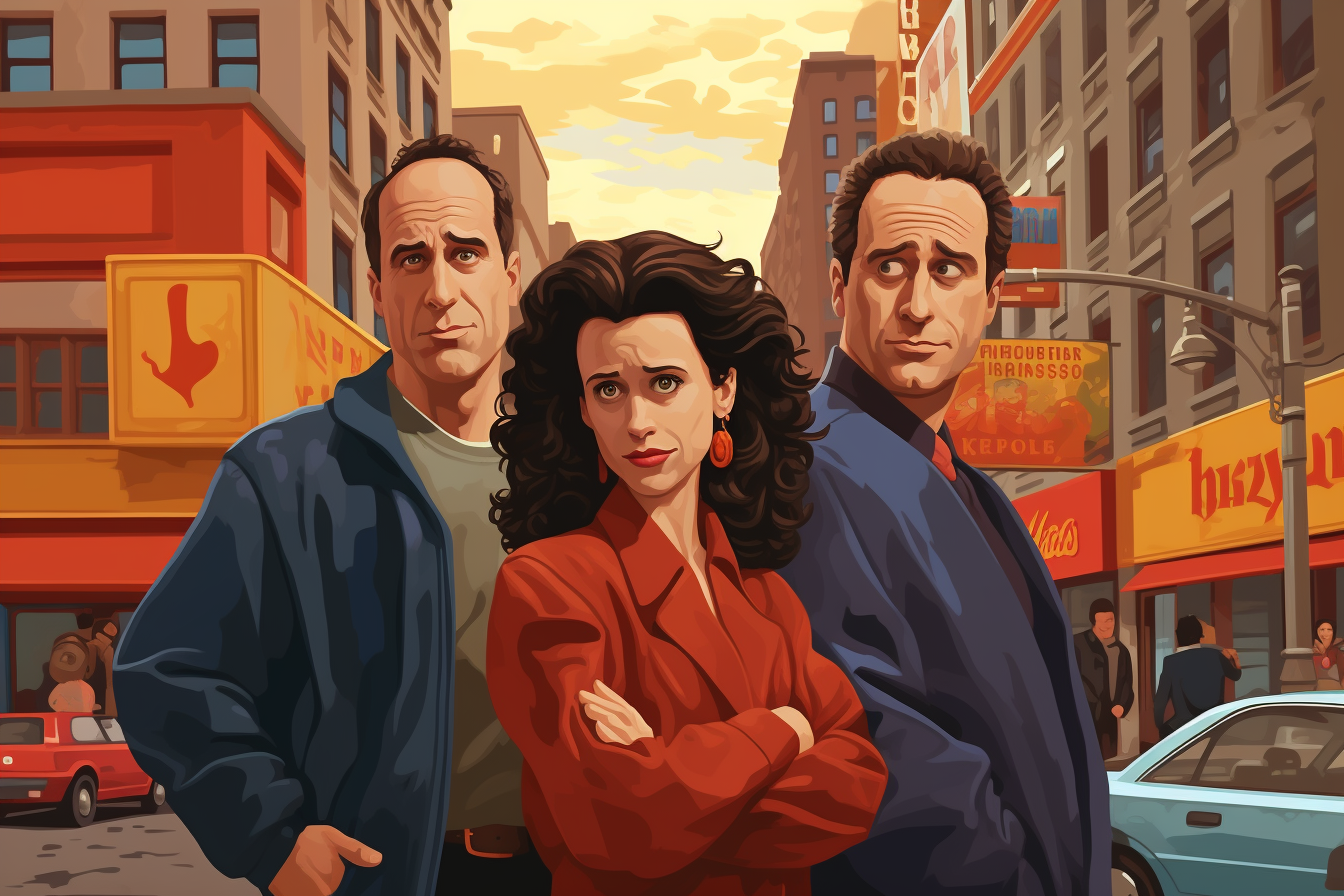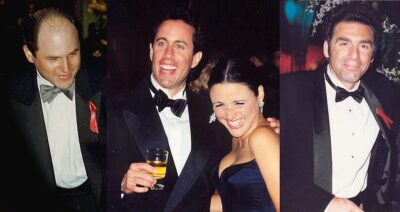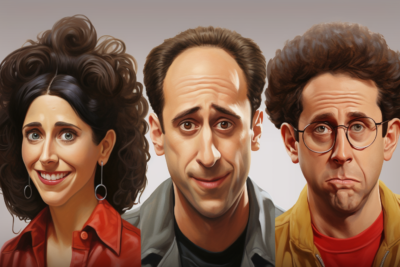Uncategorized
Why did Seinfeld End?

Why Seinfeld Ended is a question that has been asked by fans of the show since it ended its nine-season run in 1998. The answer to this question lies within the context of how television networks, studios, and producers decide which shows should continue or end production.
Seinfeld was created by Larry David and Jerry Seinfeld as a sitcom about nothing. Its premise was based on comedian Jerry Seinfeld’s real-life experiences and observations, which he discussed with his fellow comedians in coffee shops around New York City. It aired for nine seasons from 1989 to 1998 on NBC and gained an impressive following during its time on air due to its witty dialogue, unique storylines, memorable characters, and intelligent humor.
At the end of season eight, NBC made to Jerry Seinfeld a $5 million offer per episode salary if he would renew the show for another season; however, he decided against it because he felt that “the stories were getting stale” and wanted to go out while viewers still had fond memories of the show rather than pushing it too far past its peak popularity. After negotiations between NBC executives failed to produce an agreement for a tenth season renewal for financial reasons (with both sides refusing to budge), Seinfeld decided not to proceed with further production–and so why Seinfeld ended became a popular topic among fans who have sought answers ever since then.
The decision by Larry David and Jerry Seinfeld not only marked the end of one iconic TV series but also set precedent for future decisions made in television production: namely that creative quality will always be prioritized over money when it comes time for creators like them to make difficult decisions about their work’s future longevity. Ultimately this helped ensure that today’s television programs remain entertaining enough so they don’t burn out after just one or two seasons; instead, they are given adequate opportunities throughout their runs allowing them to develop into classic pieces beloved by audiences all over the world–just like ‘Seinfeld’ did during its successful nine-year run on air.
The Show About Nothing: Seinfeld’s Concept and Popularity
Seinfeld was a unique show that focused on the minutiae of everyday life, which made it stand out from other popular sitcoms. The concept behind Seinfeld–the “show about nothing”–made it relatable to its viewers since they could find something in common with each episode and situation.

The show revolved around four main characters: Jerry Seinfeld (Jerry), Elaine Benes (Elaine), George Costanza (George), and Cosmo Kramer (Kramer). Each character had their own unique traits that made them recognizable by audiences across the globe; for example, Jerry was known as the dependable friend who often found himself stuck between his friends’ antics or caught up in awkward situations.
Meanwhile, George was known for his neurotic tendencies while Kramer’s slapstick comedy provided much-needed relief from other plotlines. Elaine balanced out the group dynamic with her witty sarcasm and hilarious personality quirks.
The popularity of Seinfeld lies within its relatability – even though many episodes were exaggerated versions of mundane events, viewers still felt like they could relate to at least one character or event during each episode. This connection is what enabled Seinfeld to captivate audiences over nine seasons and helped make it an iconic part of pop culture today.
Saying Goodbye: Why Was Sitcom Seinfeld Canceled After Season 9
When Seinfeld first aired in 1989, it quickly gained traction as a fan-favorite sitcom. The show’s witty dialogue and humorous characters became ingrained in pop culture, leading to its immense popularity. While the show was beloved by viewers across the world, the creators decided to end it after season nine. After airing for 180 episodes over eight seasons, why did they choose to part ways?
The primary reason Seinfeld ended was due to Jerry Seinfeld wanted more creative freedom with his work. He wanted more control of what went into each episode and felt that continuing with a ninth season would limit this creative liberty. Moreover, Jerry had accomplished all he had set out to do with the series and thought it best to finish on a high note rather than drag on for too long and potentially risk ruining its legacy.
Larry David (Seinfeld’s co-creator) also wanted some distance from the sitcom so that he could focus on other projects; such as his HBO series Curb Your Enthusiasm which debuted shortly afterward in 2000. With both of them wanting separate paths forward professionally there wasn’t much choice but for them to call time on one of TV’s greatest comedies ever made.
Creative Differences: How Jerry Seinfeld and Jason Alexander Influenced the Decision to End the Show
Creative differences between Jerry Seinfeld and Jason Alexander played a pivotal role in the decision to end the hit show, Seinfeld. While both actors were highly acclaimed for their comedic timing and delivery of lines, they had different ideas on how the show should progress.
Jerry Seinfeld wanted to maintain control over his work and believed that staying true to his vision was paramount in order to keep up quality standards. On the other hand, Jason Alexander wanted more freedom with his character, George Costanza. He argued that he could bring out more depth in the character and still if given room to explore beyond what had already been written into scripts. This led to tension between them during production as well as numerous disagreements which eventually caused an impasse between both parties leading up to season nine’s conclusion.
The ultimate deciding factor was when NBC offered a substantial sum of money for an additional season; however, Jerry felt it would be better off concluding after nine seasons rather than stretching it out further just for monetary gain. Jerry did not want any creative decisions influenced by outside sources such as NBC executives who were keen on keeping ratings high so instead opted for ending at its peak success point before viewership inevitably dropped off due to its repetitive formulaic content structure forward past season nine.
The Last Season: What Jason Alexander Said About Seinfeld Final Episodes
When the final episode of Seinfeld aired in 1998, it ended one of the most beloved and iconic sitcoms in history. Although many people were sad to see it go, Jason Alexander – who played George Costanza – had mixed feelings about how things ended. In an interview with The Hollywood Reporter from 2019, he said that although he was grateful for being part of something so amazing, there were certain aspects about the last season which left him feeling a little disappointed.
The ninth season marked a departure from some of the traditional elements that made Seinfeld such a hit with audiences around the world. For example, instead of focusing on individual stories related to each character’s life and relationships like previous seasons did, this time round all storylines focused on Jerry and his career as a comedian. Alexander argued that due to this shift in focus viewers didn’t get enough insight into what happened to his character or any other characters after they left their apartments at the end of every episode.
Alexander also stated that while he thought overall it was still an enjoyable show right up until its conclusion when compared with earlier seasons he felt “the creative juices weren’t quite flowing” anymore; particularly towards the end where episodes seemed more formulaic than before and lacked creativity or spontaneity. It seems then that while fans may be divided over whether ending Seinfeld was ultimately beneficial or not – according to Jason Alexander at least – its final season certainly could have been better if certain changes had been made along the way.
Canceled or Not: Seinfeld’s Legacy in Syndication
Seinfeld’s nine-season run ended in 1998, but the show still lives on today. After its finale, Seinfeld entered syndication and has become one of the most successful sitcoms to ever air in reruns. Despite rumors that it was canceled for a variety of reasons, Jerry Seinfeld himself claims that it wasn’t canceled; instead, he decided to end the series while it was at its peak popularity.

The syndication deals made by NBC were some of the biggest in television history. These agreements allowed cable networks and local affiliates to broadcast episodes without having to produce new material or pay any additional fees beyond the original licensing fee. This arrangement gave viewers access to reruns at any time and enabled Seinfeld’s legacy to live on indefinitely.
It’s not hard to see why people are still so interested in this iconic comedy decades later – as with many shows, there is something timeless about its humor that transcends generational boundaries and continues resonating with audiences no matter how much time passes between viewings. From Kramer’s wild antics to George Costanza’s neurotic behavior, everyone can find something they love about this classic show even if they weren’t alive when it first aired.
Why Seinfeld is Still So Popular: The Show’s Continued Popularity
The sitcom “Seinfeld” ended in 1998, yet its legacy lives on. Nearly twenty-three years after the show’s finale, it remains one of the most popular comedies ever made. How did a television show that ran for only nine seasons become so influential? To answer this question, we must look at why “Seinfeld” resonated with viewers and continues to be relevant today.
One key element of the show was its relatable characters and situations. The main characters were four flawed individuals who represented various aspects of modern life: Jerry as an unsuccessful comedian trying to make it big; George as an indecisive person desperate for success; Elaine as a career woman struggling to find love; and Kramer as a quirky neighbor living off his eccentricities. These recognizable personalities often got themselves into amusing predicaments which left viewers laughing but also provided thoughtful commentary on societal issues like materialism or relationships.
Another important factor behind “Seinfeld”‘s success was its writing style which blended observational comedy with clever wordplay and memorable catchphrases (“No soup for you.”). Writers drew inspiration from everyday events and conversations, resulting in scripts that felt authentic rather than contrived or forced – something many other shows lack nowadays. Even though certain storylines could seem absurd (e.G. Finding lost golf balls), they always managed to feel plausible within the context of their own universe – another testament to Seinfeld’s originality compared to more formulaic sitcoms of today’s era.
Conclusion
Well, folks, Jason Alexander spills the beans about why “Seinfeld,” one of the best sitcoms in TV history, called it quits at the end of season 9. Y’know, it’s not like they ran out of gas, but they figured there was nothing new they could squeeze out of the ol’ comedic lemon. Jerry Seinfeld, Julia Louis-Dreyfus, and Michael Richards had a whale of a time for those 9 seasons, but they couldn’t keep the laughs comin’ forever, could they?
With the show’s phenomenal success, one might think that funny was not the obstacle, but as Jason Alexander explains, the iconic sitcom had, career-wise, done everything it was going to do for ’em. It had taken care of ’em financially, and oh boy, did it do that extremely well! The four of ’em, including co-creator Larry David, figured that the series finale was the perfect moment to bow out gracefully. Sure, they may have had other reasons, like a bit of burnout or just wantin’ to have a life outside the show, but ain’t that the way the cookie crumbles?
Now, don’t get me wrong, the writers were always really good, and they’d find these amazing guest people to come in all the time, injecting a constant flow of a new sense of humor into the mix. But after 9 seasons, the audience could more or less anticipate how the characters would react in any given situation.
NBC’s million-dollar offer to keep the show running couldn’t sway ’em, not even with Emmy awards under their belt. As the saying goes, “Quit while you’re ahead,” and that’s exactly what they did. So, when David and Seinfeld said, “Why don’t we tuck this baby in?” the rest followed suit, and ‘Seinfeld’ ended on a high note. Now, whenever the audience says, “This kid’s got moxie,” they’ll think back to that golden era and chuckle at the memory of those unforgettable characters and still-hilarious stand-up comedy.

FAQs
Why did Seinfeld end after 9 seasons?
Well, ya see, Jason Alexander explains that the Seinfeld gang felt there was nothing new they could do to these characters. They’d had a great run, but after 9 seasons, it was the right moment to call it a day. Jerry Seinfeld and the rest of the crew wanted to leave on a high note, instead of milking it dry.
Did the show end due to financial issues?
Oh, heavens no! Quite the opposite, actually. The show had taken care of the cast and crew financially, and they were sitting pretty. The decision to end Seinfeld wasn’t about the dough, but more about the creative juice running dry and knowing when to say enough’s enough.
Was burnout or wanting to have a life outside the show a factor in ending Seinfeld?
You betcha! While the primary reason was the obstacle was that after nine seasons of keeping things fresh, reasons like burnout and wanting to have a life beyond the show played a part too. It’s no cakewalk being part of a hit TV series, and the four of ’em wanted to explore other opportunities.
Did NBC try to keep the show going?
Oh, they sure did! They dangled a million-dollar offer in front of the showrunner, tryin’ to keep Seinfeld on the air. But, the cast and crew were adamant about ending on their terms, and so they took themselves off the air, leaving a lasting legacy as one of the greatest TV series of all time.
Did the quality of writing or guest stars decline, leading to the show’s end?
No siree! The writers were really good, and they would find these amazing guest stars to keep things fresh. The problem wasn’t a lack of talent or thought funny, but rather that after 9 seasons, the show had given all it could, and they wanted to wrap things up before it lost its magic touch.
Was there a specific reason why the show ended after Season 9?
Well, the reason we discussed earlier was that the four amigos felt they’d run out of fresh ideas. The reason I think, they wanted to avoid rehashing old material and didn’t see any way to top their previous work in Season 9.

